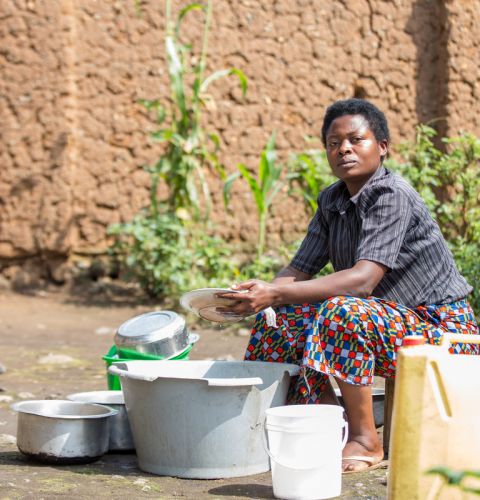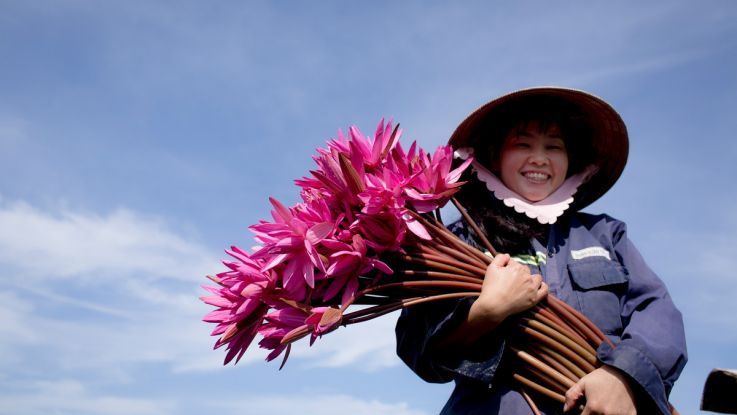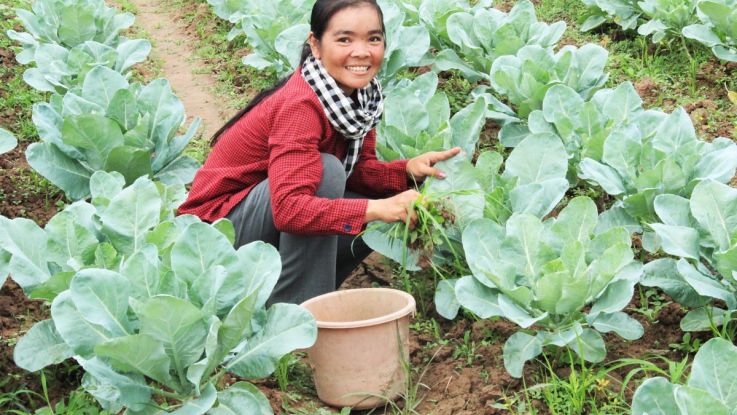Unpaid care and domestic work
75%
of women perform 75% of unpaid work globally, dedicating, on average, four hours and 25 minutes daily, more than three times men’s average of one hour and 23 minutes.1
16.4 billion
hours are spent on unpaid care work daily.2
40%
of girls aged between five and 14 years old spend 40% more time, or 160 million more hours per day on unpaid household chores, collecting water and firewood compared to boys.3
How does unpaid care and domestic work affect women?
Women carry out a disproportionate share of unpaid care and domestic work.
Across the world, women and girls are performing more than three-quarters of the total amount of unpaid care and domestic work and two-thirds of care workers are women.4
How many unpaid care and domestic workers are women?
Women take on three times as much unpaid care and domestic work as men around the world.
606 million women of working age perform unpaid care and domestic work on a full-time basis, compared with just 41 million men.2
In 2016, ActionAid calculated that over their lifetime women spend four additional years working versus men.5
They perform 75% of unpaid work globally, dedicating, on average, four hours and 25 minutes daily which is more than three times men’s average of one hour and 23 minutes.6
This includes caring for children, caring for the sick and the elderly, taking care of household tasks like cleaning, cooking, collecting water, fetching firewood and subsistence farming.
In rural Ethiopia, for example, the proportion of women collecting water (71%) is four times that of men (29%).7
In addition, the average duration of these activities - collecting water - is also higher for women (more than seven hours) than for men (less than six hours).8
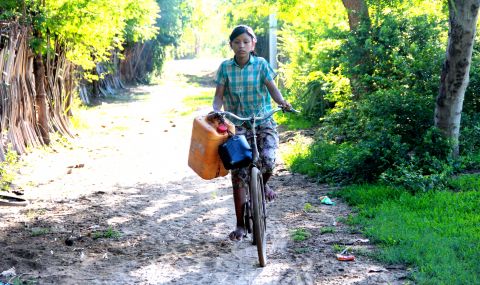
Girls in parts of Myanmar fetch water as part of their household tasks.
The impact on paid work and education
Time spent on unpaid care and domestic tasks usually mean women have less time and resources to spend on education and paid work.
Gender inequalities in unpaid care and domestic work are linked to gender gaps in labour force participation and pay.
The bigger the difference in the division of care responsibilities between women and men, the higher the gender gaps in quality, paid work.
For example, in countries where women spend nearly eight times the amount of time on unpaid care and domestic work than men, they represent only 35% of the active paid working population.9
While paid work is valued because it contributes to the improvement of women's lives, it's the type of paid work and working conditions that will make the most difference.
Poorly paid and low-quality work also has a negative effect on women's care work. According to research by the Institute of Development Studies, low paid and informal work, very often the predominant type of work women engage in, can undermine the time women have to care for their children.10
The effects of unpaid work on the gender pay gap
Worldwide, women are paid only two-thirds of what men earn for the same work. In 2020, women made only $0.81 for every dollar made by men.11
Women’s wages everywhere lag far behind those of men, even when they perform the same jobs12.
According to the OECD, in countries where women spend a disproportionately larger amount of time on unpaid care and domestic work (as compared to men), the gender gap (in hourly wages, for paid work) is also bigger.
For example, in countries where women spend twice as much time as men in caring duties, they earn only 65% of what their male counterpart earns for the same job.
This drops to 40% where women are spending five times the amount of time on unpaid care and domestic work (for full-time employees).13
Lower quality of employment for women
Unpaid care and domestic work, along with societal norms that embed stereotypes of what jobs women can and cannot do has a knock-on effect on the quality of employment for women.
Unpaid care and domestic responsibilities narrow women’s choices in the type of job they get, often condemning them to informal or low-paid employment and dramatically swelling their hours of work overall – what is called women’s “double burden”.
It is unsurprising, then, that women’s wages everywhere lag far behind those of men.
The impact of Covid-19 on unpaid work
Amid the Covid-19 pandemic, informal women workers have faced the risk of falling into extreme poverty as a result of government-ordered lockdowns and additional care and domestic responsibilities. With the closure of essential services such as schools and day-care centres, the responsibility of educating and caring for children has been borne disproportionately by women.
Women have also shouldered the responsibility for taking care of sick family members and implementing hygiene practices within the home - all in addition to existing unpaid care and domestic responsibilities.
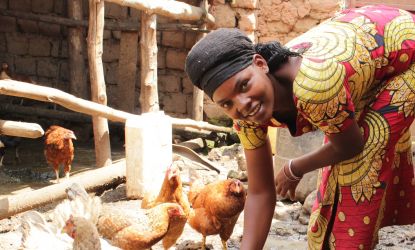
Supporting women to reduce their unpaid care and domestic work
32-year old Aliane in Rwanda used to spend a lot of her time on subsistence farming and housework.
She then joined a local women's cooperative, where she learned new agricultural techniques and accessed loans to start a new poultry business with the help of ActionAid.
ActionAid also provided Aliane with an improved, energy-efficient cooking stove, which means she spends less time looking for firewood, and a rainwater harvesting tank so she can spend less time fetching water for her household tasks.
I was trained by ActionAid on how to become a businesswoman, how to do sustainable agriculture, how to start income-generating activities, and reducing the time spent on unpaid care and domestic work. I thank very much ActionAid, their partners, and donors for the training, advice, and financial support.”
Aliane reduced her unpaid care work and invested her time in learning business skills
Jean de la Croix Havugimana/ActionAid
The impact of unpaid care and domestic work on girls
Due to gender inequalities, stereotypes and power imbalances, women and girls are often seen as innate ‘caregivers’ and relied on for unpaid care and domestic work from a very young age. This work includes tasks such as caring for younger siblings, cooking, doing most of the household chores, and collecting water or firewood.
Globally, girls between the ages of five and nine spend 30% more time helping around the house than boys of the same age. This rises to 50% of their time for girls aged ten to 14.14
Other studies have found that girls spent more time on caring and household chores by age of 12, and that by age 19 these differences had widened further. This means that during adolescence, a time for girls and boys to develop their ambitions and build skills for the future, girls’ future aspirations are constrained by the realities of their lives and the disproportionate burden of work they pick up at the household level.15
Girls who spend a lot of their time on unpaid care and domestic work could miss out on education or drop out of school altogether. Those who go to school and still have to work at home may find that their education is affected by missing classes or being too tired to concentrate.
Unpaid work, even at school
Unpaid care and domestic work often follows girls into the classroom where they are expected to undertake domestic tasks as well. A recent study by Plan International found that girls take on different responsibilities to boys at school, such as sweeping and collecting rubbish from the school grounds than their male peers, leaving them with less time for schoolwork.16
During current Covid-19 crisis, many families have faced a loss of income and financial uncertainty. From previous crises, we know that girls have often been expected to pick up additional work at home, contribute to household income, or to care for younger children – and that these responsibilities are often prioritised above returning to school. Analysis has suggested that up to 10 million more secondary school-aged girls could drop out of school due to the pandemic.17
Four ways to challenge unpaid care and domestic work
Women's unpaid care and domestic work is largely invisible to policy agendas, and hugely unvalued in economic terms. In response to this feminist economists, civil society organisations and activists have been proposing a set of solutions to radically reprioritise care: the transformative ‘4Rs’ framework.
1. Recognise unpaid care and domestic work, which is done primarily by women and girls, as a type of work or production that has real value. Acknowledge and better understand the enormous contribution that women make to the economy by shouldering a disproportionate burden of unpaid care and domestic work. People and caring responsibilities ought to be at the centre of economic policies.
2. Reduce the total number of hours spent on unpaid care and domestic work through better access to affordable and quality time-saving infrastructure. Ensure sufficient public finances are raised and allocated to fund gender-responsive public services (GRPS)18, including infrastructure (electricity, water and sanitation facilities); education; health (including sexual and reproductive health) and care for the young and the elderly.
3. Redistribute unpaid care and domestic work more fairly within the household and simultaneously shift the responsibility of unpaid care and domestic work to the state. Roll out progressive tax reforms to fund the provision of gender-responsive public services.
4. Represent the most marginalised caregivers and ensure that they have a voice in the design and delivery of policies, services and systems that affect their lives. Design and implement labour policies and social protection mechanisms to protect women and girls and enable their access to decent and dignified work, in line with the ILO Decent Work Agenda.19
How ActionAid supports unpaid care and domestic workers
We have a longstanding body of research and policy work calling for the recognition, reduction, redistribution and representation of unpaid care and domestic work. As part of this, we campaign for the provision of gender-responsive public services.
For example, in Rwanda ActionAid is testing and scaling up interventions to reduce the time women spend on unpaid care and domestic work through the setting up of Early Childhood Development Centres. Evidence suggests that due to the childcare available at these centres, women gained five additional hours per day to engage in income-earning activities, as well as having more time to take care of themselves.20
Governments and global macroeconomic agenda setters like the IMF and World Bank have a huge role to play in co-creating progressive tax systems, putting a stop to austerity and cancelling debt for countries in the global south. These macroeconomic policy changes, which ought to happen so that a more gender-just system can one day exist, will have a significant impact on women's and girls' lives; particularly on their ability to access decent jobs. ActionAid is part of a global movement calling for this change.
Through our programmes, ActionAid works with women, girls, men and boys to create awareness about unpaid care and domestic work, associated gender stereotypes and how important it is to redistribute unpaid care and domestic work within the household and between communities and the state.
ActionAid’s POWER Project
ActionAid’s POWER (Promoting Opportunities for Women’s Empowerment and Rights) Project is working through local partners in Bangladesh, Ghana, and Rwanda to mobilise and organise rural women to raise awareness of and claim their rights as farmers and caregivers.
The project’s objective is to increase the income (and the ability to control this income) for 21,000 rural women in these countries.
We are doing this by addressing unpaid care and domestic work and, increasing women’s productivity and access to markets through the practice of agroecology.
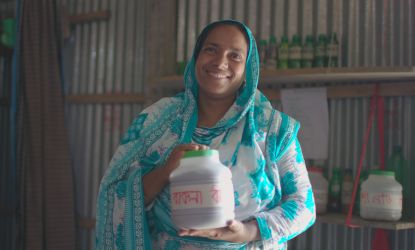
Redistributing unpaid care and domestic work in households
Before she became involved in POWER (Promoting Opportunities for Women's Empowerment and Rights), 27-year-old Aslema, in northern Bangladesh, was a housewife with no means of earning her own money. From morning to night, her day was taken up with domestic tasks, from cleaning to helping her children with their homework.
But local ActionAid staff have been running workshops where women and their husbands learn about the unfair burden of unpaid care and domestic work and are encouraged to share the load. The POWER project supports women’s groups to advocate local and national governments to recognise and value unpaid care and domestic work, as well as time-saving initiatives, like building water sources close to homes and opening childcare centres.
Now, Aslema and her husband divide their tasks equally, which has given Aslema more time to work on her sewing business, join various local committees and get an office job. Having the time to earn an income has meant she can now pay for her children’s education. “That is my biggest achievement,” she says.
If my husband and I divide our unpaid care work between us, then we can finish tasks sooner and focus on income-generating work together.”
27-year-old Aslema was a housewife with no means of earning her own money
ActionAid
Footnotes
- 1http://unesdoc.unesco.org/images/0022/002267/226792e.pdf
- 2https://www.ilo.org/asia/media-centre/news/WCMS_633284/lang--en/index.htm#:~:text=Data%20from%2064%20countries%20representing,per%20day%20with%20no%20remuneration.
- 3https://www.kcl.ac.uk/news/womens-unpaid-care-work-has-been-unmeasured-and-undervalued-for-too-long
- 4https://actionaid.org/sites/default/files/publications/Who%20Cares%20-%20Summary%20Report%20-%20final%20revised.pdf
- 5https://www.ilo.org/wcmsp5/groups/public/---dgreports/---dcomm/---publ/documents/publication/wcms_633135.pdf
- 6https://actionaid.org/sites/default/files/publications/Who%20Cares%20-%20Summary%20Report%20-%20final%20revised.pdf
- 7https://www.ilo.org/wcmsp5/groups/public/---dgreports/---dcomm/---publ/documents/publication/wcms_633135.pdf
- 8https://www.ilo.org/wcmsp5/groups/public/---dgreports/---dcomm/---publ/documents/publication/wcms_633135.pdf
- 9https://www.oecd.org/dev/development-gender/Unpaid_care_work.pdf
- 10file:///Users/arsheen/Downloads/GrOW%20global%20synthesis%20report%20final.pdf
- 11https://www.payscale.com/data/gender-pay-gap
- 12ttps://wbg.org.uk/blog/and-still-we-earn-less-the-gender-pay-gap-in-the-uk/
- 13https://www.oecd.org/dev/development-gender/Unpaid_care_work.pdf
- 14https://www.unicef.org/gender/files/Harnessing-the-Power-of-Data-for-Girls-Brochure-2016-1-1.pdf
- 15https://www.younglives.org.uk/content/tracing-links-between-girls%E2%80%99-unpaid-care-work-and-women%E2%80%99s-economic-empowerment
- 16https://plan-uk.org/blogs/unpaid-care-work-the-burden-on-girls
- 17https://downloads.ctfassets.net/0oan5gk9rgbh/6TMYLYAcUpjhQpXLDgmdIa/dd1c2ad08886723cbad85283d479de09/GirlsEducationandCOVID19_MalalaFund_04022020.pdf
- 183 https://actionaid.org/publications/2018/framework-2018-gender-responsive-public-services
- 19https://www.ilo.org/global/topics/decent-work/lang--en/index.htm
- 20ActionAid (2015), Delivering Women’s Farmers Rights, http://www.actionaid.org/sites/files/actionaid/delivering_on_women_farmers_rights.pdf
Page updated 23 July 2024
